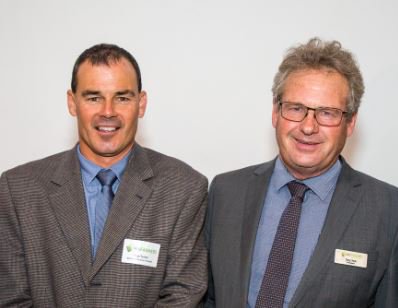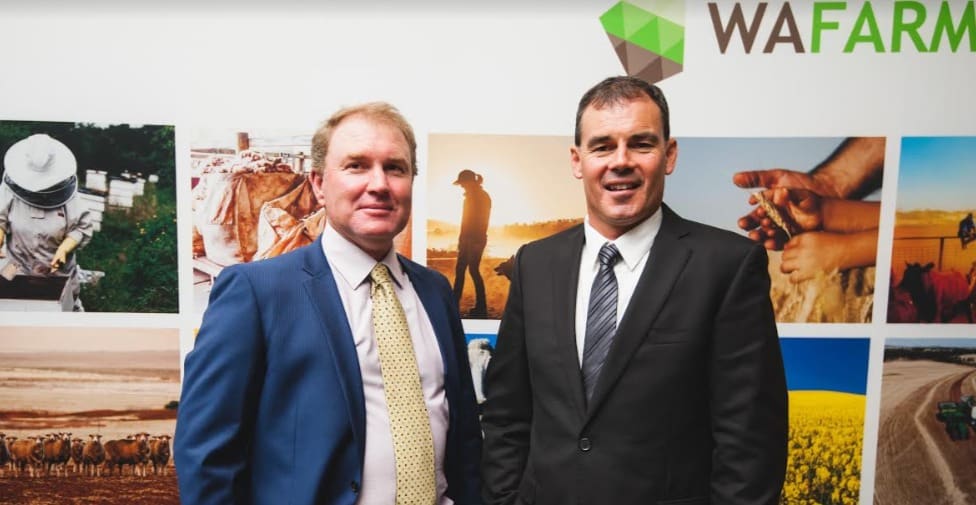
New WAFarmers president Rhys Turton, left, with outgoing president Tony York.
NEW Western Australian farmer leader Rhys Turton believes the live export of sheep can improve its image and become acceptable to the community.
WAFarmers delegates elected Mr Tyrton, 48, to replace outgoing president Tony York after the organisation’s 2019 annual general meeting at the WAFarmers Conference, Trending Ag 2019, in the Pan Pacific Hotel in Perth.
Mr Turton is a mixed sheep, grain and hay farmer from York, in the state’s wheatbelt. He runs a flock of 2500 Merino ewes with about two thirds joined to Merino rams and the remainder to White Suffolk rams. He has supplied sheep for live export.
Mr Turton said Australian Livestock Exporters Council chairman Simon Crean told the conference the Australian Labor Party’s consideration of a five-year phase-out of the trade if it won the coming federal election was unacceptable, although perhaps there was scope for more investment in chilled meat exports.
Mr Turton said although WAFarmers the proposed three-month moratorium on Middle East sheep shipments during the northern summer, but the WA industry agreed a live export phase-out was unacceptable.
“At this stage it (live export) is very dear to the hearts of WA producers because we are the state that exports the most sheep live.
“Our industry needs the support of the live export trade,” he said.
“We believe we can work with the community to improve its image and make any further improvements that the trade might need to become again an acceptable industry.”
If the live trade was phased out, there would be sheep that would have gone on the boat that need to be marketed domestically, he said.
“There would have to be I guess investment in processing and markets found – but I think producers are quite flexible in the way they run their operations and how they market product if those markets are available.
“There is certainly work to be done there, if it works out that way.”
High sheep meat and wool prices to underpin flock numbers

New WAFarmers president Rhys Turton, right, with newly-elected vice president and wool producer Steve McGuire.
Despite the historically low WA flock numbers, Mr Turton said the buoyant prices for sheep meat and wool would underpin the WA industry, although he didn’t expect a swing into sheep by cropping farmers.
“Some of the flock dispersals we’ve seen over the last few months have realised very high prices for breeding ewes, so I think we are going to see that side of the industry well underpinned.
“I wouldn’t be surprised if it has bottomed out and it might turner the corner and we might see a gradual incline in numbers,” he said.
“If we can get another kind season over here then sheep producers should be travelling quite well.”
Mr Turton was elected by the WAFarmers membership for a two-year term. He has been involved with WAFarmers for over many years and is moving into the president role after serving as senior vice president.
WAFarmers chief executive officer Trevor Whittington thanked outgoing president Tony York as an excellent steward for the organisation and advocate for rural Western Australia.
“WAFarmers has entered a period of re-invigorating the membership base and establishing a clear path to set the agenda ahead of the next Federal Election and Mr Turton brings a wealth of experience within the agricultural industry to the role of President,” Mr Whittington said.
“The WA farming community is committed to high standards across all its practices and Mr Turton shares our common goal in increasing our presence in the public arena to firmly establish our place on the national agenda.”
Mr Turton is also chairman of the Council of Grain Growers Organisation and a Grain Growers Limited director.
“Changes to the agricultural industry globally are moving at a breakneck speed and WAFarmers needs to be an agile organisation to adapt to the new landscape of modern farming and agribusiness.
“Work is already underway within the organisation to increase its visibility and influence in reforming policy on a state and national level and as new President I will work with the WAFarmers team to restructure the organisation,” he said.

“We believe we can work with the community to improve its image and make any further improvements that the trade might need to become again an acceptable industry.”
Let me just start by saying, the only time the trade was “an acceptable industry”, was when the public, the media and MPs knew little about the truth of it.
What Mr Turton needs to understand first and foremost, is that the public is now informed – and given what I’ve seen in my 12 years campaigning against the live export trade, much more informed than the trade’s supporters.
It’s not the image you need to improve, it’s the practice — the voyage, the handling and slaughter in importing countries.
As a bare minimum, pre-stunning for both Halal and Shehita slaughter needs to be mandatory, as it is in government facilities in Jordan. That means that any animal being exported live for slaughter at least has a chance at competent pre-stunning as they do here. Gloating about adhering to OIE regulations, which are legally unenforceable and still include fully conscious slaughter, is not going to cut it.
That leaves the voyages. Industry has already baulked at complying with reviewed heat stress regulations that would see the wet bulb temperature not exceed 28 degrees, but I would suggest that improvements need to be attained for better protection for the animals shipped; protocols that protect them during rough seas and guarantee that regardless of “unforeseen heat events” (industry speak for Middle Eastern summer), no animals will be subjected to conditions that would see them die from heat stress.
Bring the required (annualised) mortality rate down to on-farm rates for same age, weight and condition sheep (so not counting new-born lambs) who die on farm from anything that doesn’t include drought, bushfire, predators, lightning strike, freezes and lambing difficulties, given the sheep on board would (hopefully) face none of those threats… then we can talk.